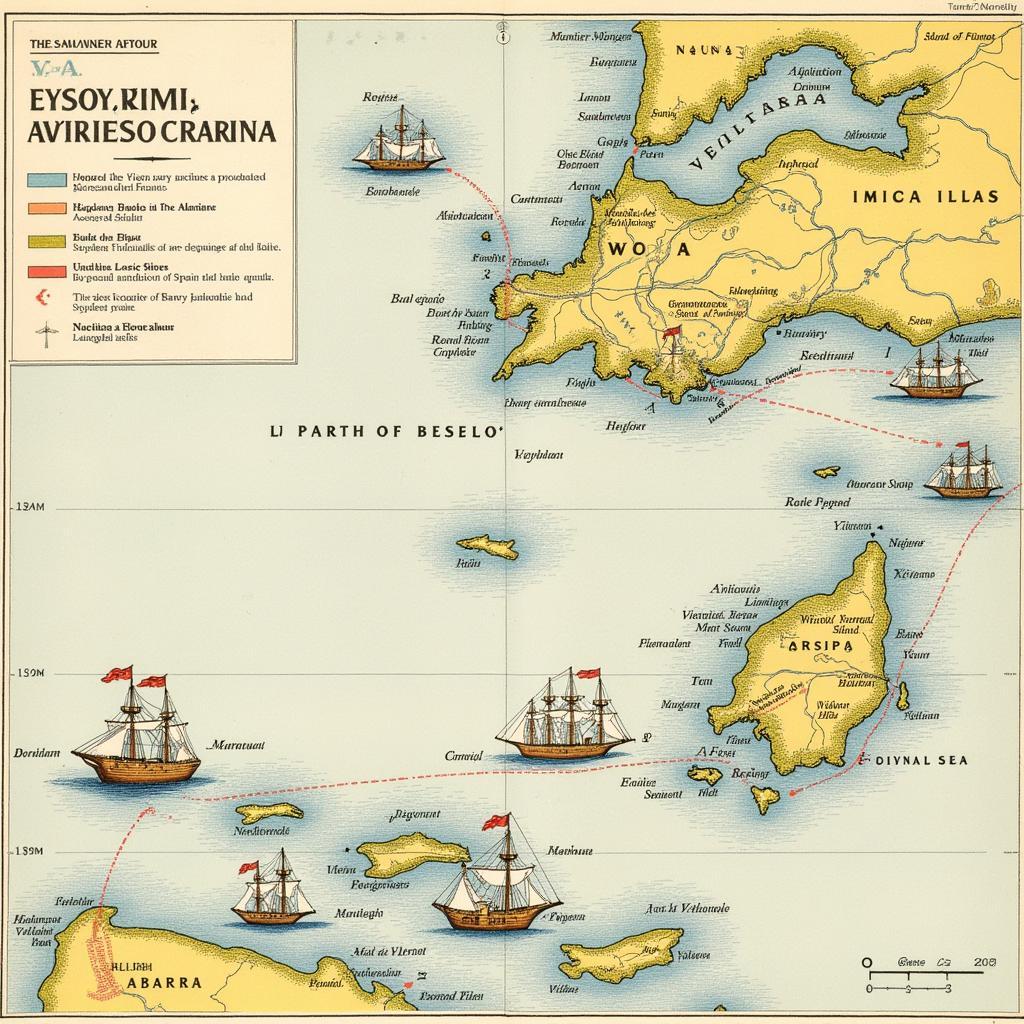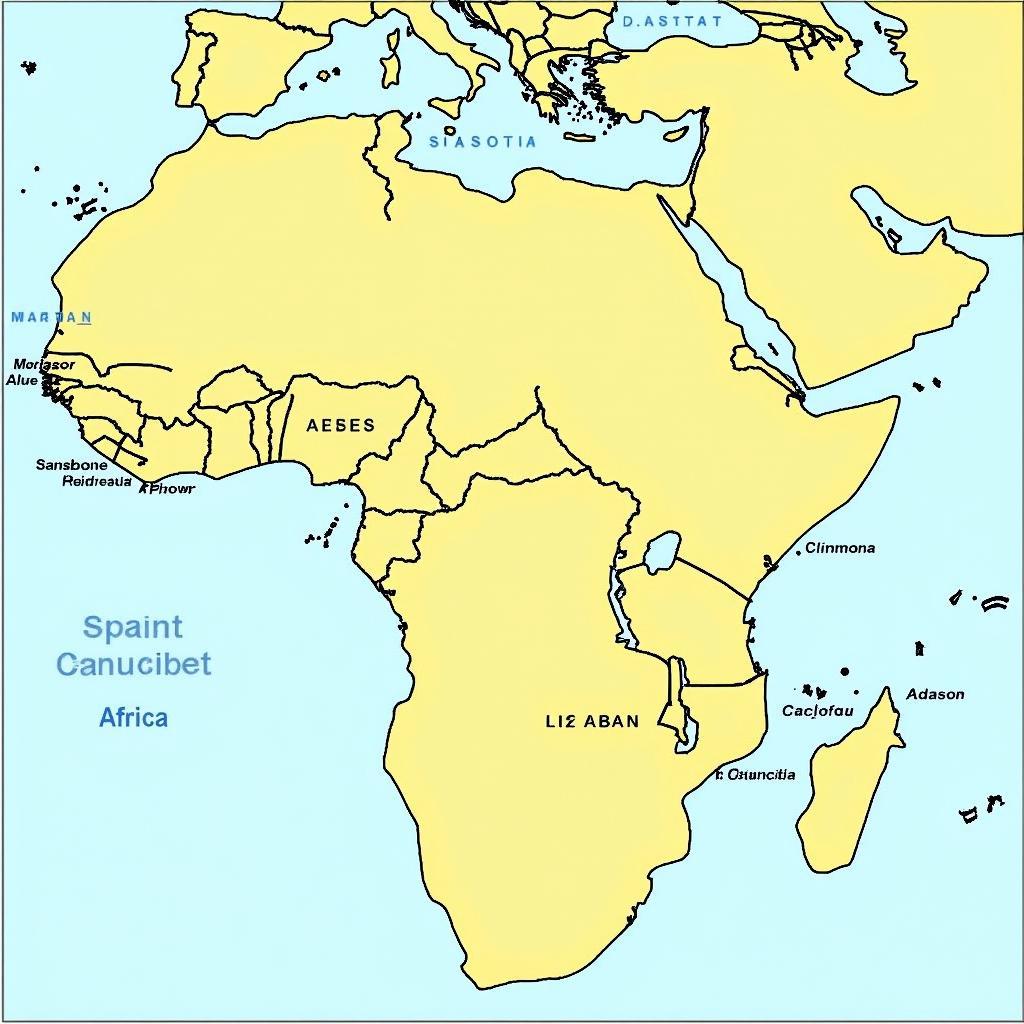Uncovering Spain’s African Colonies: A Forgotten History
The Spanish Empire, renowned for its vast territories across the Americas, also held sway over parts of Africa, a history often overshadowed by other European colonial powers. This article delves into the lesser-known narrative of the African Colonies Of Spain, exploring their impact and legacy. We will uncover the motivations behind Spanish colonialism in Africa, examine the regions under their control, and analyze the complex relationship between Spain and the African continent. You’ll soon have a richer understanding of this often overlooked piece of history. See the map below of African colonies in 1930.
The Spanish presence in Africa began in the 15th century, driven primarily by the quest for resources, strategic ports, and the spread of Christianity. Unlike other European powers, Spain’s colonial ambitions in Africa remained relatively limited, focusing predominantly on coastal enclaves and islands. This strategic approach allowed them to control key trade routes and establish a foothold on the continent. Their involvement in the transatlantic slave trade, though less extensive than that of Portugal or Britain, played a significant role in shaping the demographics and social dynamics of the affected regions.
The Canary Islands: A Springboard for Conquest
The Canary Islands, situated off the coast of Northwest Africa, served as the initial stepping stone for Spanish expansion into Africa. The indigenous Guanches population faced conquest and assimilation, setting a precedent for future Spanish colonial encounters. From the Canaries, Spanish explorers ventured further south, establishing outposts along the West African coast.
 Spanish Canary Islands: A Colonial Outpost
Spanish Canary Islands: A Colonial Outpost
Spanish Sahara: A Desert Colony
Spanish Sahara, now known as Western Sahara, became a significant Spanish colony in the late 19th century. Rich in natural resources, particularly phosphates, the region attracted Spanish interest. The nomadic Sahrawi people resisted Spanish rule, leading to prolonged conflict and tension. The legacy of Spanish colonialism continues to impact the region today, as the issue of Western Sahara’s sovereignty remains unresolved.
Equatorial Guinea: A Complex Legacy
Spanish Guinea, comprising Río Muni on the mainland and the islands of Bioko and Annobón, represents another complex chapter in the history of the African colonies of Spain. The Spanish imposed their language, culture, and administrative systems on the diverse ethnic groups inhabiting the territory. Equatorial Guinea gained independence in 1968, but the remnants of Spanish colonialism continue to shape its political and social landscape. You can find more about the African kings selling slaves.
The Impact of Spanish Colonialism
The impact of Spanish colonialism in Africa varied across regions. While the introduction of new crops and infrastructure had some positive effects, the overall consequences were largely detrimental. The exploitation of resources, forced labor, and suppression of local cultures left a lasting scar on the affected communities. To understand more about the impact, one might consider when the 1st slaves of African descents came.
What Were Spain’s Primary Motivations for Colonizing Africa?
Spain’s motivations were primarily economic, strategic, and religious. They sought access to resources, strategic ports for trade and naval operations, and aimed to convert African populations to Christianity.
Which African Countries Were Colonized by Spain?
The primary African colonies of Spain included Spanish Sahara (Western Sahara), Spanish Guinea (Equatorial Guinea), and the Canary Islands. Spain also held smaller territories and outposts along the West African coast.
 Spanish Africa Colonies Map and Trade Routes
Spanish Africa Colonies Map and Trade Routes
What Languages are Spoken in Former Spanish Colonies in Africa?
Spanish remains an official language in Equatorial Guinea and is still spoken in Western Sahara alongside Arabic. The African countries where Spanish is spoken highlight the linguistic legacy of Spanish colonialism.
Conclusion
The history of the African colonies of Spain provides a nuanced perspective on the complex dynamics of European colonialism in Africa. Although less expansive than other European powers, Spain’s presence left an indelible mark on the regions they controlled. Understanding this often overlooked aspect of history is crucial for comprehending the present-day realities of these nations. The legacy of Spanish colonialism continues to shape the political, social, and cultural landscapes of former Spanish colonies, reminding us of the enduring impact of this historical period.
FAQ
- What was the largest Spanish colony in Africa? Spanish Sahara (Western Sahara).
- When did Equatorial Guinea gain independence from Spain? 1968.
- What were the primary resources extracted from Spanish Sahara? Phosphates.
- What was the name of Spanish Guinea before independence? Spanish Guinea.
- Are the Canary Islands still part of Spain? Yes.
- What is the current status of Western Sahara? Its sovereignty remains disputed.
- What is the official language of Equatorial Guinea? Spanish.
Common Scenarios and Questions:
-
Scenario: A researcher is studying the impact of Spanish colonialism on the languages spoken in Africa.
-
Question: Which African countries still have Spanish as an official language?
-
Scenario: A student is preparing a presentation on the lesser-known European colonial powers in Africa.
-
Question: What were the key territories controlled by Spain in Africa?
-
Scenario: A traveler is planning a trip to Equatorial Guinea and wants to learn more about its history.
-
Question: What influence did Spanish colonialism have on the culture of Equatorial Guinea?
Further Exploration:
For further information, explore these related articles on our website: African colonies 1930 map, when the 1st slaves of African descents came and details about African kings selling slaves.
Need Assistance?
For any questions or assistance, please contact us at Phone Number: +255768904061, Email: kaka.mag@gmail.com or visit our office at Mbarali DC Mawindi, Kangaga, Tanzania. Our customer support team is available 24/7.

